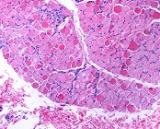Diabesity: A Call for Urgent Action

This activity will highlight new updates in our understanding of how diabesity develops and describe the negative physiologic effects of this disease on multiple body systems, notably the cardiovascular and renal systems. Optimal treatments for diabesity will be identified, along with an overview of the health burden of diabesity related to long-term complications and reduced function, quality of life and life expectancy.
Category
- Disease management
- Wellness
Format
- Webcasts
Credits
- 1.00 ACPE - Pharmacists
- 1.00 ACPE - Pharmacy Technicians
- 1.00 AMA - Physicians
- 1.00 ANCC - Nurses
- 1.00 APA - Psychologists
- 1.00 Attendance - General Attendance
- 1.00 CDR - Dietitians
- 1.00 ASWB - Social Workers
Cervical Cancer: Etiology, Diagnosis, Treatment Options and Outcomes

During this educational activity, learners will become familiar with the etiology and diagnosis of cervical cancer and explore treatment options and outcomes for relapsed, recurrent and metastatic disease. Advances in current cervical cancer clinical research trials will also be addressed.
Category
- Oncology
Format
- Webcasts
Credits
- 1.00 ACPE - Pharmacists
- 1.00 ACPE - Pharmacy Technicians
- 1.00 AMA - Physicians
- 1.00 ANCC - Nurses
- 1.00 APA - Psychologists
- 1.00 Attendance - General Attendance
- 1.00 CCMC - General - Case Managers
- 1.00 ASWB - Social Workers
Living-Donor Liver Transplant for Patients with Liver Cancer

This activity will provide an overview of the living-donor liver transplant procedure, the advantages and disadvantages of living-donor liver transplant, and the optimal timing for offering living donations to patients with liver cancer. Dr. Hughes will discuss the innovative approach advanced by experts at UPMC in which patients with liver cancer are offered the option of a living-donor transplant. He will discuss the experience and expertise offered by the UPMC Liver Transplant Program and their collaborative approach to working with referring physicians.
Category
- Disease management
- Oncology
- Transplantation
Format
- Webcasts
Credits
- 1.00 ACPE - Pharmacists
- 1.00 ACPE - Pharmacy Technicians
- 1.00 AMA - Physicians
- 1.00 ANCC - Nurses
- 1.00 APA - Psychologists
- 1.00 Attendance - General Attendance
- 1.00 CCMC - General - Case Managers
- 1.00 ASWB - Social Workers
The Continuous Distribution Model: A New System for Organ Allocation

In this activity, participants will learn about the timeline for UNOS’s implementation of this flexible, points-based approach for all organ systems; how continuous distribution differs from the current system; and how this program is expected to benefit those who await organ transplant and impact future organ-allocation policy.
Category
- Disease management
- Transplantation
Format
- Webcasts
Credits
- 0.75 ACPE - Pharmacists
- 0.75 ACPE - Pharmacy Technicians
- 0.75 AMA - Physicians
- 0.75 ANCC - Nurses
- 0.75 APA - Psychologists
- 0.75 Attendance - General Attendance
- 0.75 CCMC - General - Case Managers
- 0.75 CDR - Dietitians
- 0.75 ASWB - Social Workers
Duchenne Muscular Dystrophy: Utilizing Personalized Treatments and Addressing Health

This activity will discuss emerging therapies for DMD and the importance of incorporating a personalized interprofessional care plan, along with the role of health disparities and how these impacts access to care and outcomes for these individuals.
Category
- Disease management
- Health equity
- Rare diseases
Format
- Webcasts
Credits
- 1.00 ACPE - Pharmacists
- 1.00 ACPE - Pharmacy Technicians
- 1.00 AMA - Physicians
- 1.00 ANCC - Nurses
- 1.00 APA - Psychologists
- 1.00 Attendance - General Attendance
- 1.00 CCMC - General - Case Managers
- 1.00 ASWB - Social Workers
Complex Medical Conditions in Children: Utilizing Personalized Treatments and Addressing Health Disparities

This podcast will focus on the connection between SDoH and how they may impact access to care, treatment and health outcomes for children with rare and CMC. Listeners will be provided with strategies and resources that can address these negative effects. The importance of access to personalized care that they require to live their healthiest lives will be discussed.
Category
- Disease management
- Health equity
Format
- Podcasts
Credits
- 1.25 ACPE - Pharmacists
- 1.25 ACPE - Pharmacy Technicians
- 1.25 AMA - Physicians
- 1.25 ANCC - Nurses
- 1.25 APA - Psychologists
- 1.25 Attendance - General Attendance
- 1.25 CCMC - General - Case Managers
- 1.25 ASWB - Social Workers
Providing Quality Care for Adults With Intellectual and Developmental Disabilities

This activity will provide learners with an overview of clinical considerations in adults with IDD and improve communication skills and practices that can better guide treatment choices to address the specific needs of these individuals. Learners will take a closer look at existing bias, stigma and discrimination toward these individuals and learn strategies to address these issues in practice. Lastly, the value of improved interprofessional team collaboration between health care professionals (HCPs), caregivers and direct support professionals will be discussed.
Category
- Intellectual and developmental disabilities
Format
- Webcasts
Credits
- 2.00 ACPE - Pharmacists
- 2.00 ACPE - Pharmacy Technicians
- 2.00 AMA - Physicians
- 2.00 ANCC - Nurses
- 2.00 APA - Psychologists
- 2.00 Attendance - General Attendance
- 2.00 CCMC - General - Case Managers
- 2.00 CDR - Dietitians
- 2.00 COPE - Optometrists
- 2.00 ASWB - Social Workers
Guardianship

Guardianship can provide safe and healthy care for individuals with special health care needs. Familiarity with the requirements and processes surrounding the assignment of legal guardianship is essential for health care professionals (HCPs) to competently determine guardianship eligibility. This activity will provide an overview of the types of guardianship that exist, how the need for a guardian is determined and the process of establishing guardianship. It will help guide HCPs through common issues and challenges that may arise during this process, including the need for determining the individual’s competency. HCPs will also gain insight into how to identify circumstances that may require further intervention and review indications that ethics committee involvement or risk management processes may be necessary.
Category
Format
- Online Education
Credits
- 1.00 ANCC - Nurses
- 1.00 Attendance - General Attendance
- 1.00 CCMC - General - Case Managers
- 1.00 ASWB - Social Workers
Unraveling the Past, Paving the Way for the Future—Rethinking Pulmonary Function Tests Beyond Race

Pulmonary function tests (PFTs) are commonly utilized for the diagnosis and ongoing monitoring of pulmonary conditions. However, the inclusion of race in the reporting and interpretation of PFT results introduces the potential to contribute to health disparities and amplify race-based health inequities. This activity aims to enhance participants’ comprehension of race-based adjustments in clinical algorithms and increase competency in race-neutral and impartial interpretation of PFTs.
The faculty speaker for this webcast, Dr. Nirav Bhakta, served as the co-chair of the American Thoracic Society (ATS) workshop responsible for shaping the 2023 ATS statement on race in PFT interpretation. Drawing upon his extensive expertise as a pulmonologist and his pivotal role in the formulation of these new ATS guidelines, Dr. Bhakta will delve into the historical context behind race-specific PFTs, address the rationale behind the shift and review the pivotal aspects and implications of adopting a race-neutral approach.
Category
- Disease management
- Health equity
Format
- Online Education
Credits
- 1.00 AAFP - Family Physicians
- 1.00 ABIM MOC - Physicians
- 1.00 ACPE - Pharmacists
- 1.00 ACPE - Pharmacy Technicians
- 1.00 AMA - Physicians
- 1.00 ANCC - Nurses
- 1.00 APA - Psychologists
- 1.00 Attendance - General Attendance
- 1.00 ASWB - Social Workers
Integrating Care Teams in a Virtual World

This activity will examine how the multiple aspects of digital health can be best utilized by health care team members to ensure continuity of the patient’s health care journey, meet care plan goals, improve patient outcomes and optimize team communication practices. The ability of virtual health care practices to enable team members to fulfill their roles in clinical decision-making and care plan implementation will be discussed. Important legal, regulatory and reimbursement considerations that pertain to digital practice integration within the health care team will be highlighted.
Category
- Digital health
Format
- Webcasts
Credits
- 1.00 ACPE - Pharmacists
- 1.00 ACPE - Pharmacy Technicians
- 1.00 AMA - Physicians
- 1.00 ANCC - Nurses
- 1.00 APA - Psychologists
- 1.00 Attendance - General Attendance
- 1.00 ASWB - Social Workers

 Facebook
Facebook Twitter
Twitter LinkedIn
LinkedIn Forward
Forward